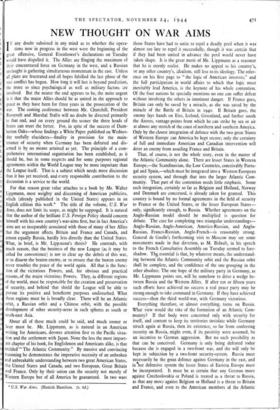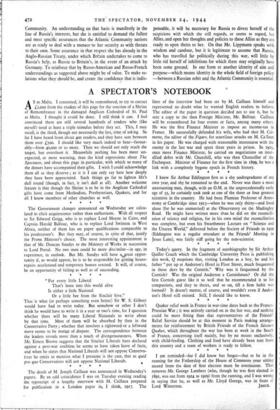NEW THOUGHT ON WAR AIMS
F any doubt subsisted in any mind as to whether the opera- ]. tions now in progress in the west were the beginning of the great offensive, General Eisenhower's declarations on Tuesday would have dispelled it. The Allies are flinging the maximum of their concentrated force on Germany in the west, and a Russian onslaught is gathering simultaneous momentum in the east. Unless all plans are frustrated•and all hopes falsified the last phase of the vast conflict has begun. How long it will last is beyond prediction, the more so since psychciogical as well as military factors are Involved. But the nearer the end appears to be, the more urgent is it that the major Allies should be as united in the approach to peace as they have been for three years in the, prosecution of the car. The coming conference between Mr. Churchill, President Roosevelt and Marshal Stalin will no doubt be directed primarily o that end, and on every ground the- sooner the three heads of States can meet the better. For, in spite of the success of Dum- arton Oaks—whose findings a White Paper published on Wednes- day usefully elucidates—finality in provision for the main- enance of security when Germany has been defeated and dis- rmed is by no means attained as yet. The principle of a com- prehensive international organisation has been established, as it hould be, but in some respects and for some purposes regional agreements within the World League may be more impoitant than the League itself. That is a subject which needs more discussion than it has yet received, and every responsible contribution to the discussion is a service to the world.
For that reason great value attaches to a book by Mr. Walter Lippmann, most weighty and discerning of American publicists, which (already published in the United States) appears in an English edition this week.* The title of the volume, U.S. War Aims, does not limit its scope, as might be suppoked. It is natural that the author of the brilliant U.S: Foreign Policy should concern himself with his own country's war-aims first, but in fact America's aims are so inseparably associated with those of many of her Allies that the argument affects Britain and France and Canada, and Most equally Russia, hardly less directly than the United States. What, in brief, is Mr. Lippinann's thesis? He contends, with much reason, that the business of the new League (as it may be called for convenience) is not to clear up the debris of this war, or to disarm the beaten enemy, or to ensure that the beaten enemy never troubles the peace of the world again. All that is the func- tion of the victorious Powers, and, for obvious and practical easons, of the major victorious Powers. They, in different regions of the world, must be responsible for the creation and preservation c of security, and behind that shield the League will be able to ursue its positive and beneficent purposes undisturbed. What these regions must be is broadly clear. There will be an Atlantic o rbit, a Russian orbit and a Chinese orbit, with the possible development of other security-areas in such spheres as south or south-east Asia.
a. About all of these much could be said, and much sooner or ter must be. Mr. Lippmann, as is natural in an American riling for Americans, devotes attention first to the Pacific situa- on and the settlement with Japan. None the less the most import- ant chapter of his book, for Englishmen and Americans alike, is that entitled'" The Atlantic Community." By massive and convincing reasoning he demonstrates the imperative necessity of an unbroken and unbreakable understanding between two great American States, the United States and Canada, and two European, Great Britain and France. Only by their union can the security not merely of Western Europe but of all America be guaranteed. In two wars * U.S. War Aims. (Hamish Hamilton. 75. 6d.)
a
those States have had to unite to repel a deadly peril when it was almost too late to repel it ,successfully, though it was certain that if they had been united in advance the peril would never have taken shape. It is the great merit of Mr. Lippmann as a reasoner that he is sternly realist. He makes no appeal to his country's, or any other country's, idealism, still less to its ideology. The refer- ence on his first page to " the logic of American interests," and the full participation in world affairs to which that logic must inevitably lead America, is the keynote of his whole contention. Of the four nations he specially mentions no one can suffer defeat without involving the others in imminent danger. If France goes, Britain can only be saved by a miracle, as she was saved by the miracle of the Battle of Britain in 194o. If Britain goes, the enemy lays hands on Eire, Iceland, Greenland, and farther south the Azores, vantage-points from which he can strike by sea or air at almost any stretch of the coast of northern and southern America. Only by the closest integration of defence with the two great States of Western Europe can America be kept secure; only the certainty of full and immediate American and Canadian intervention will deter an enemy from assailing France and Britain.
That, of course, is not the whole story, even in the matter of the Atlantic Commubity alone. There are lesser States in Western Europe,—the Scandinavian, the Low Countries, conceivably Portu- gal and Spain,—which must be integrated into a Western European security system, and through that into the larger Atlantic Com- munity. That part of the contention needs little emphasis. Some such integration, certainly so far as Belgium and Holland, Norway and Denmark are concerned, is already taken for granted. This country is bound by no formal agreements in the field of security to France or the United States, or the lesser European States— only, significantly enough, to Russia. Whether agreements on the Anglo-Russian model should be multiplied is question for debate. The case for completing two triangular understandings- Anglo-Russian, Anglo-American, Americo-Russian, and Anglo- Russian, Franco-Russian, Anglo-French--is reasonably strong. General de Gaulle's forthcoming visit to Moscow may see some movements made in that direction, as M. Bidault, in his speech to the French Consultative Assembly on Tuesday seemed to fore- shadow. Ths, essential is that, by whatever means, the understand- ing between the Atlantic Community orbit and the Russian orbit shall be complete, and the confidence of the one grouping in the other absolute. The one hope of the military party in Germany, as Mr. Lippmann points out, will be somehow to drive a wedge be- tween Russia and the Western Allies. If after ten or fifteen years such efforts have achieved no success a real peace party may be strong enough to take command in Germany. If they have achieved success—then the third world-war, with Germany victorious.
Everything therefore, or almost everything, turns on Russia. What view would she take of the formation of an Atlantic Com- munity? If that body were concerned only with security for itself, and content to keep its territories inviolate while Germany struck again at Russia, then its existence, so far from conferring security on Russia, might even, if its passivity were assumed, be an incentive to German aggression. But no such possibility as that can be conceived. Germany is only being defeated today because she is engaged in a two-front war, and she will only be kept in subjection by a two-front security-system. Russia must necessarily be the great defence against Germany in the east, and in 'ter defensive system the lesser States of Eastern Europe must be incorporated. It must be as certain that any German move against Czechoslovakia or Poland is treated as a threat to Russia, as that any move against Belgium or Holland is a threat to Britain and France, and even to the American members of the Atlantic Community. An understanding on that basis is manifestly in the line of Russia's interests, but she is entitled to demand the fullest and most specific assurances that the Atlantit Community nations are as ready to deal with- a menace sto her security as with threats to their own. Some assurance in that respect she has already in the Anglo-Russian Treaty, under which Britain undertakes to come to Russia's help, as Russia to Britain's, in the event of an attack by Germany. To reinforce that by Russo-American and Russo-French understandings as suggested above might be of value. To make re- lations what they should be, and create the confidence that is indis- pensable, it will be necessary for Russia to divest herself of the suspicions with which she still regards, or seems to regard, her Allies, and open her thoughts and policies to those Allies as they are ready to open theirs to her. On that Mr. Lippmann speaks with wisdom and candour, but it is legitimate to assume that Russia, who has travelled far politically during this war, will little by little rid herself of inhibitions for which there may originally have been some ground. In one form or another identity of aim and purpose—which means identity in the whole field of foreign policy —between a Russian orbit and the Atlantic Community is essential.



























 Previous page
Previous page